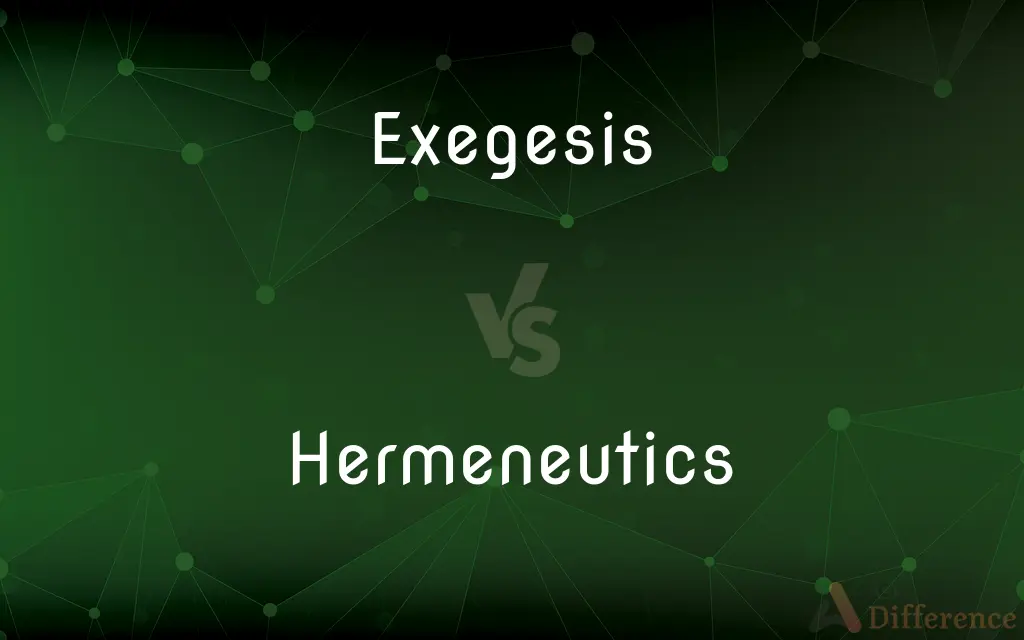Exegesis vs. Hermeneutics — What's the Difference?
By Tayyaba Rehman & Urooj Arif — Updated on March 26, 2024
Exegesis is the critical interpretation and explanation of a text, especially religious scripture, focusing on discovering its original meaning. Hermeneutics is the broader field of study concerned with the theory and methodology of interpretation.

Difference Between Exegesis and Hermeneutics
Table of Contents
ADVERTISEMENT
Key Differences
Exegesis involves a detailed, analytical approach to understanding a specific text's language, context, and historical background to uncover its intended meaning. This process is commonly applied to religious scriptures like the Bible or the Quran, where understanding the nuances of ancient languages, cultural contexts, and historical circumstances is crucial. On the other hand, hermeneutics extends beyond textual analysis to encompass the philosophical and methodological questions surrounding the act of interpretation itself. It deals with how we understand and interpret not only texts but also symbols, events, and social practices.
While exegesis is a practical application of reading and interpreting a text, often involving specific methodologies such as textual criticism, historical analysis, and linguistic study, hermeneutics engages with the theoretical aspects of interpretation. Hermeneutics asks broader questions about the nature of understanding, the influence of the interpreter's own context and presuppositions, and the interaction between the text and its reader. This includes considering the interpreter's historical and cultural positioning and how it affects understanding.
One key aspect of hermeneutics is the hermeneutic circle, a concept that describes the process of understanding a text by moving back and forth between its parts and the whole. This idea suggests that understanding a text as a whole helps to comprehend its individual components and vice versa. Exegesis, while it may implicitly use such a process, focuses more concretely on employing scholarly techniques to elucidate a text's meaning as accurately as possible.
Hermeneutics also addresses the challenges and limitations of interpretation, acknowledging that texts may have multiple valid interpretations and that understanding can be influenced by the reader's perspective. In contrast, exegesis strives for objectivity, seeking to minimize personal bias and uncover what the text originally meant to its first audience.
The relationship between exegesis and hermeneutics is intertwined; exegesis can be seen as the application of hermeneutical principles to a specific text. Hermeneutics provides the theoretical foundation upon which exegetical practices are built, offering a framework for understanding the complex dynamics of interpreting texts and other forms of communication.
ADVERTISEMENT
Comparison Chart
Definition
Critical interpretation of a text to uncover its original meaning.
Study of the theory and methodology of interpretation.
Focus
Specific texts, especially religious scriptures.
Broad, including texts, symbols, events, and social practices.
Approach
Analytical, employing specific methodologies.
Philosophical, engaging with theoretical questions.
Key Concepts
Textual criticism, historical context, linguistic analysis.
Hermeneutic circle, the influence of the interpreter's context.
Objective
To determine a text's intended meaning.
To understand the nature of interpretation itself.
Compare with Definitions
Exegesis
Employing methods like historical and linguistic analysis.
Through exegesis, they clarified an obscure ancient manuscript's meaning.
Hermeneutics
Engages with the hermeneutic circle concept.
She applied the hermeneutic circle to deepen her analysis of literary works.
Exegesis
Focuses on uncovering the original intentions of the text.
His exegesis revealed the cultural nuances influencing the scripture.
Hermeneutics
The theory of understanding and interpreting texts and symbols.
His study in hermeneutics led him to explore the philosophy of language.
Exegesis
Detailed analysis of a text to interpret its meaning.
The scholar's exegesis of the biblical passage provided new insights into its historical context.
Hermeneutics
Concerns with the process and challenges of interpretation.
Hermeneutics examines how personal biases affect understanding.
Exegesis
Applied primarily to religious or historical texts.
The theologian's exegesis offered a fresh interpretation of a well-known parable.
Hermeneutics
Explores the interaction between the interpreter and the text.
In hermeneutics, the reader's context is considered part of the interpretation.
Exegesis
Aims for an objective understanding of the text.
Her exegesis used archaeological evidence to support her interpretations.
Hermeneutics
Addresses broader philosophical questions.
Hermeneutics led to discussions on the multiplicity of meanings in a single text.
Exegesis
Critical explanation or analysis, especially of a text.
Hermeneutics
Hermeneutics () is the theory and methodology of interpretation, especially the interpretation of biblical texts, wisdom literature, and philosophical texts. Hermeneutics is more than interpretative principles or methods used when immediate comprehension fails and includes the art of understanding and communication.Modern hermeneutics includes both verbal and non-verbal communication as well as semiotics, presuppositions, and pre-understandings.
Exegesis
A critical explanation or interpretation of a text, especially a religious text.
Hermeneutics
The theory and methodology of interpretation, especially of scriptural text.
Exegesis
An explanatory note; a gloss.
Hermeneutics
The study or theory of the methodical interpretation of text, especially holy texts.
Exegesis
Exposition; explanation; especially, a critical explanation of a text or portion of Scripture.
Hermeneutics
The science of interpretation and explanation; exegesis; esp., that branch of theology which defines the laws whereby the meaning of the Scriptures is to be ascertained.
Exegesis
The process of finding the roots of an equation.
Hermeneutics
The branch of theology that deals with principles of exegesis
Exegesis
An explanation or critical interpretation (especially of the Bible)
Common Curiosities
Are there common criticisms of exegesis and hermeneutics?
Common criticisms include concerns over subjectivity in interpretation, potential anachronism in applying modern perspectives to ancient texts, and debates over the prioritization of authorial intent versus reader response.
How do cultural and historical contexts influence exegesis?
Cultural and historical contexts are crucial in exegesis as they help interpret the text as it would have been understood in its original time and place, offering insights into the text's meanings, purposes, and implications.
How does one choose between different hermeneutical approaches?
Choosing between hermeneutical approaches often depends on the interpreter's objectives, the nature of the text, and the context of interpretation, with each approach offering different insights and focusing on various aspects of the interpretive process.
Can hermeneutics lead to multiple interpretations of the same text?
Yes, hermeneutics acknowledges and explores the possibility of multiple valid interpretations of the same text, emphasizing the role of the interpreter's perspective, background, and the text's flexibility in meaning.
Can exegesis be performed without hermeneutics?
While exegesis can be conducted using specific methodologies, it inherently relies on hermeneutical principles to guide its interpretive process.
How does the hermeneutic circle influence exegesis?
The hermeneutic circle informs exegesis by highlighting the reciprocal relationship between understanding the parts and the whole of a text.
Are there different approaches within hermeneutics?
Yes, hermeneutics encompasses various approaches, including philosophical, theological, and literary, each offering unique insights into the process of interpretation.
How have digital technologies impacted exegesis and hermeneutics?
Digital technologies have expanded access to texts and interpretive tools, facilitated collaborative interpretations, and introduced new forms of textual analysis, thereby enriching the practice of exegesis and the study of hermeneutics.
Why is hermeneutics important in interpretation?
Hermeneutics is crucial because it addresses the underlying processes, challenges, and philosophical questions involved in interpreting texts and other forms of communication.
Can hermeneutics apply to non-textual objects?
Yes, hermeneutics applies to the interpretation of symbols, events, and cultural practices, beyond just written texts.
What is the main difference between exegesis and hermeneutics?
Exegesis is the practice of interpreting a text to find its original meaning, while hermeneutics is the theory of how interpretation works.
How do exegesis and hermeneutics impact religious studies?
They are fundamental to religious studies, providing tools and frameworks for interpreting sacred texts and understanding their implications in contemporary contexts.
Is objectivity possible in exegesis according to hermeneutics?
Hermeneutics acknowledges that complete objectivity is challenging due to the influence of the interpreter's context, though exegesis strives for as much objectivity as possible.
How do modern interpretations fit into exegesis and hermeneutics?
Modern interpretations are explored through exegesis by applying contemporary hermeneutical theories, which consider current cultural and philosophical perspectives.
Share Your Discovery

Previous Comparison
Caudal vs. Cranial
Next Comparison
Useable vs. UsableAuthor Spotlight
Written by
Tayyaba RehmanTayyaba Rehman is a distinguished writer, currently serving as a primary contributor to askdifference.com. As a researcher in semantics and etymology, Tayyaba's passion for the complexity of languages and their distinctions has found a perfect home on the platform. Tayyaba delves into the intricacies of language, distinguishing between commonly confused words and phrases, thereby providing clarity for readers worldwide.
Co-written by
Urooj ArifUrooj is a skilled content writer at Ask Difference, known for her exceptional ability to simplify complex topics into engaging and informative content. With a passion for research and a flair for clear, concise writing, she consistently delivers articles that resonate with our diverse audience.














































